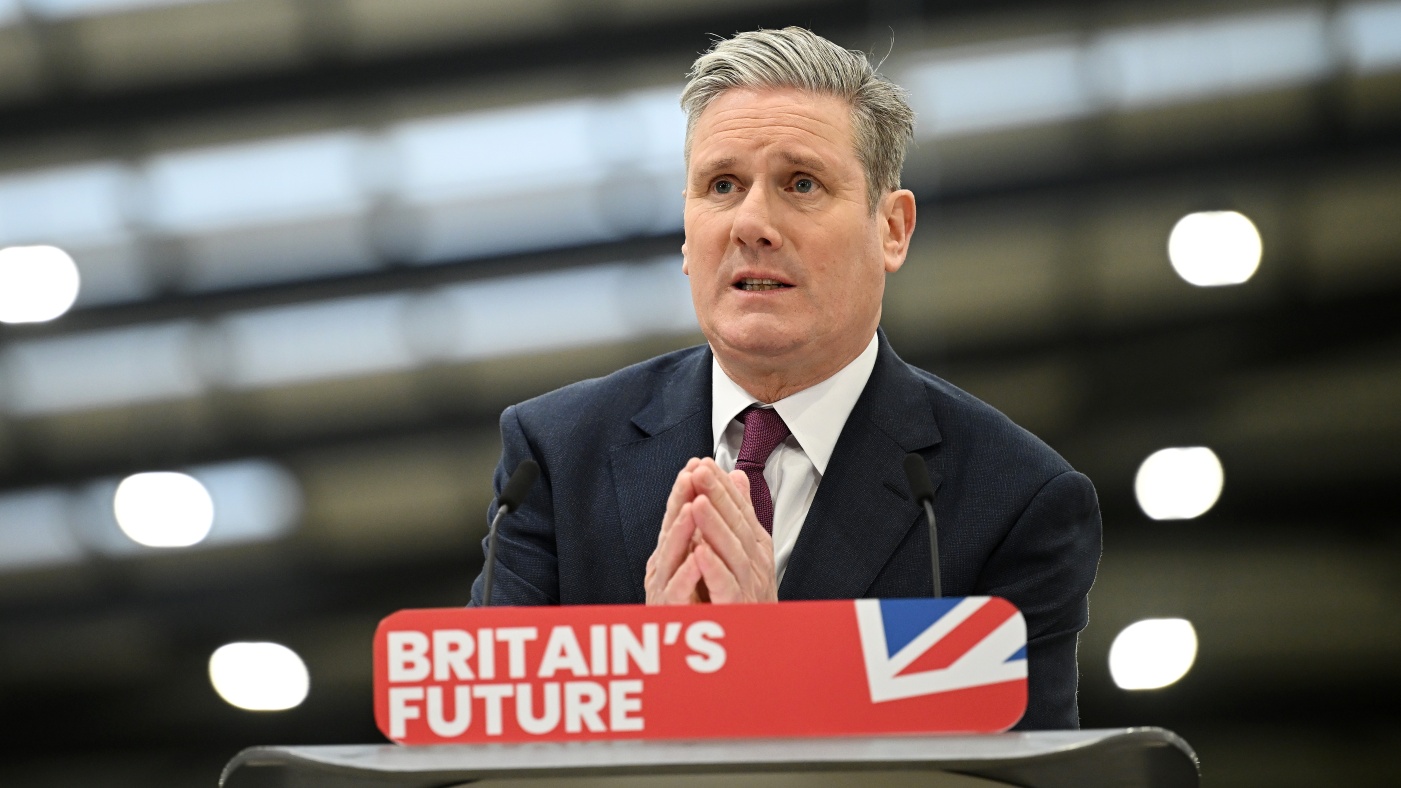What happens behind the scenes in Whitehall when power changes hands
Preparations must begin for a possible transition of power to a Labour government, says think tank

A free daily email with the biggest news stories of the day – and the best features from TheWeek.com
You are now subscribed
Your newsletter sign-up was successful
The Labour Party should immediately begin talks with the civil service to ensure a smooth transition of power should they win the next general election, according to a major think tank.
The Institute for Government (IfG) has warned that time is running out to prepare both the Labour Party and the civil service for a new government under Keir Starmer. Labour has an enormous 24-point lead in the polls, according to the latest YouGov figures.
With so-called "access talks" between Whitehall mandarins and the opposition typically beginning at around 16 months before polling day, the IfG report says that "time is running short", with the next general election to be held no later than 28 January 2025.
The Week
Escape your echo chamber. Get the facts behind the news, plus analysis from multiple perspectives.

Sign up for The Week's Free Newsletters
From our morning news briefing to a weekly Good News Newsletter, get the best of The Week delivered directly to your inbox.
From our morning news briefing to a weekly Good News Newsletter, get the best of The Week delivered directly to your inbox.
Access talks 'blocked' by Sunak
Cabinet Secretary Simon Case is said to have recommended access talks, only to be "blocked" by Rishi Sunak, who "feared it would lead to civil servants 'downing tools' in preparation for an election", said The Times.
But as leader of the opposition, Starmer "must write a letter formally requesting" access talks, which the prime minister can accept or refuse, said The House. It is unclear whether Starmer has yet requested talks. However, the magazine reported in December that the Labour leader's office has said only "that there have been no talks nor talk of talks".
The party wants to ensure all of its "costings" are correct before they meet with Whitehall officials, according to Labour sources who spoke to the magazine. Until "you've bashed the wrinkles out" of your policies, "there's a real limit on what the civil service can do other than smile and nod", a former mandarin told the magazine.
'Douglas-Home rules'
Pre-election talks between opposition politicians and officials are "established routines" in many countries, said The Economist, and are occasions where "questions can be posed and plans tested" before the transition of power, especially when – as in the UK – there is no formal transition period.
A free daily email with the biggest news stories of the day – and the best features from TheWeek.com
In Britain, there is instead an "awkward dance of hesitant approaches and furtive exchanges" between the opposition and the civil service.
So-called "access talks" began roughly 60 years ago, approved by then-prime minister Alec Douglas-Home. They were allowed under three conditions: they were "discreet", conducted on a "factual basis" and, most importantly, the prime minister had to "know nothing whatsoever" about their content.
But aside from these guidelines, now known as the "Douglas-Home rules", the actual terms of these meetings – such as who should be involved, and when they should happen – remain murky for all involved.
For the prime minister, there is a risk that being seen to "connive with the opposition" will damage party morale, while opposition leaders fret about "appearing presumptuous". And for civil servants too, the process is "awkward" as they attempt to "tactfully" advise shadow ministers under whom they may soon be working, without attracting the ire of the current prime minister.
Yet these talks are an extremely important part of ensuring that if an opposition party takes power, they have given "advance notice (or warning) of their policy priorities", said The New Statesman.
"It's not the civil service advising the opposition," Terence Burns, a former permanent secretary of HM Treasury, told the magazine, but rather "receiving rather than transmitting, so that if the opposition party wins the general election, the civil service can help them to hit the ground running".
'Measuring the curtains'
The Labour Party may face accusations of "measuring the curtains" at No. 10 by triggering access talks, said the IfG, but "history is clear: any opposition that is serious about winning and wants to achieve change should make this a priority in the final 12–18 months before an election".
And whenever these talks do begin, Labour "must make the most of them", said Cath Haddon, a programme director at the IfG, writing for LabourList.
Civil servants will doubtless be facing "many difficulties under a potential Labour government", said The New Statesman, including having to "grapple with rising prices, Brexit, the UK's unbalanced economy, artificial intelligence regulation, climate change" and a plethora of other challenges facing the country.
Access talks will be far from straightforward, not least because "Labour's five missions are not confined neatly to five individual departments, so Starmer and his team will need to work with the Cabinet Office to arrange cross-cutting talks", said Haddon.
Sorcha Bradley is a writer at The Week and a regular on “The Week Unwrapped” podcast. She worked at The Week magazine for a year and a half before taking up her current role with the digital team, where she mostly covers UK current affairs and politics. Before joining The Week, Sorcha worked at slow-news start-up Tortoise Media. She has also written for Sky News, The Sunday Times, the London Evening Standard and Grazia magazine, among other publications. She has a master’s in newspaper journalism from City, University of London, where she specialised in political journalism.
-
 How the FCC’s ‘equal time’ rule works
How the FCC’s ‘equal time’ rule worksIn the Spotlight The law is at the heart of the Colbert-CBS conflict
-
 What is the endgame in the DHS shutdown?
What is the endgame in the DHS shutdown?Today’s Big Question Democrats want to rein in ICE’s immigration crackdown
-
 ‘Poor time management isn’t just an inconvenience’
‘Poor time management isn’t just an inconvenience’Instant Opinion Opinion, comment and editorials of the day
-
 The Mandelson files: Labour Svengali’s parting gift to Starmer
The Mandelson files: Labour Svengali’s parting gift to StarmerThe Explainer Texts and emails about Mandelson’s appointment as US ambassador could fuel biggest political scandal ‘for a generation’
-
 Will Peter Mandelson and Andrew testify to US Congress?
Will Peter Mandelson and Andrew testify to US Congress?Today's Big Question Could political pressure overcome legal obstacles and force either man to give evidence over their relationship with Jeffrey Epstein?
-
 Reforming the House of Lords
Reforming the House of LordsThe Explainer Keir Starmer’s government regards reform of the House of Lords as ‘long overdue and essential’
-
 How long can Keir Starmer last as Labour leader?
How long can Keir Starmer last as Labour leader?Today's Big Question Pathway to a coup ‘still unclear’ even as potential challengers begin manoeuvring into position
-
 What is at stake for Starmer in China?
What is at stake for Starmer in China?Today’s Big Question The British PM will have to ‘play it tough’ to achieve ‘substantive’ outcomes, while China looks to draw Britain away from US influence
-
 Can Starmer continue to walk the Trump tightrope?
Can Starmer continue to walk the Trump tightrope?Today's Big Question PM condemns US tariff threat but is less confrontational than some European allies
-
 Three consequences from the Jenrick defection
Three consequences from the Jenrick defectionThe Explainer Both Kemi Badenoch and Nigel Farage may claim victory, but Jenrick’s move has ‘all-but ended the chances of any deal to unite the British right’
-
 Alaa Abd el-Fattah: should Egyptian dissident be stripped of UK citizenship?
Alaa Abd el-Fattah: should Egyptian dissident be stripped of UK citizenship?Today's Big Question Resurfaced social media posts appear to show the democracy activist calling for the killing of Zionists and police